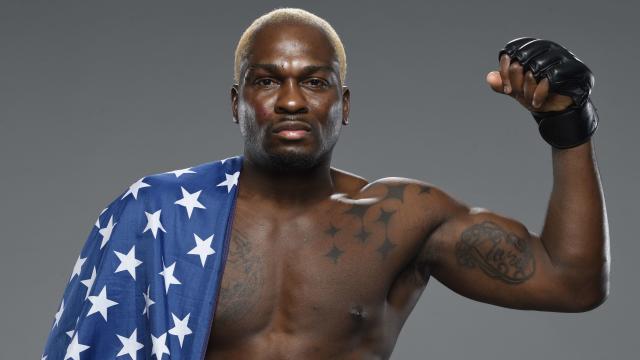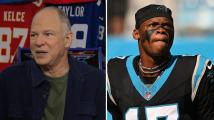Derek Brunson talks Darren Till matchup, feels for 'broke' UFC fighters
Derek Brunson joins Yahoo Sports' Kevin Iole to preview his UFC Vegas 36 headlining bout versus Darren Till. The UFC's No. 5-ranked middleweight also talks fighter pay and why he feels for fighters who can't make ends meet.
Video Transcript
KEVIN IOLE: Hey, folks. I am Kevin Iole. Welcome to "Yahoo Sports," and my guest now is a guy who for a while has run [? roughshod ?] through all the younger stars and the up and coming stars of the UFC's middleweight division. Now he's going to go for one of the more established guys. I am talking about Derek Brunson. Derek, how are you doing, my friend?
DEREK BRUNSON: I'm good, how are you?
KEVIN IOLE: I'm doing awesome. You fight Darren Till on Saturday over at Apex and in a key middlewight bout. Is it a little more exciting to go with a guy that's up high in the rankings? Your last two, Edmen Shahbazyan and Kevin Holland, both young guys with promise, but certainly they weren't fulfilled as fighters at this point?
DEREK BRUNSON: Yeah, you know, to have a guy like Darren Till, a former title challenger and a guy with a lot of eyes on him, he's like one of the top guys in the UK, huge following. You know, this is a funner match up than these guys, you know, where I feel like I just have to protect my spot more so.
KEVIN IOLE: And I would think, you know, when you fight Kevin Holland you just kept taking him down repeatedly, and Holland actually went to AKA for some remedial wrestling training after that. But you know, you were kind of in a no win situation there, right? Because if you stand in [? slug ?] with him you put yourself in the position to maybe get knocked out and if you do what you did people are going to complain, oh, it's boring, and you just held him down. So don't you look at it as like in that fight you were almost in a no win situation?
DEREK BRUNSON: Oh yeah, for sure. You had a guy who haven't fought anybody tough. You know, he had a great year in 2020, but yeah, it's a no win situation. I think, what was it? I was ranked maybe seven he's ranked 10. So like, you know, he's a guy who had a lot of buzz being his previous year, but it really wasn't a lot to gain from that and not a lot of traction going forward.
KEVIN IOLE: Right. Now fighting Darren Till, you know, I wonder if do you look at it this way. Jorge Mazvidal got on his roll when he knocked out Darren Till a fight that I think most people thought Till was the favorite to win. It was in the UK, he was the bigger guy. And that sort of got Masvidal on a roll to where he ended up getting a championship shot and he got the BMF fight, and the whole nine yards. Do you view Till the same way as a guy, like, if you can go ahead and take care of Darren Till that this is going to place you squarely in the middle of the running for a fight with the champion?
DEREK BRUNSON: Oh yeah, for sure. You know, I've won four in a row so I feel an impressive win over Till definitely could line me up for the next title shot after Whittaker and Adesanya fight, you know. Think they're trying to schedule that fight for December, early next year. So I'm in no rush to fight, you know, I go out here and finish this guy impressively then yeah, I think I should sit back and finally get that title shot I haven't gotten in my career yet.
KEVIN IOLE: What do you see in Till? I mean, you know, he was-- What was he, like 17 and 0 or 18 and 0. Lost, I think, three of his last four if I'm not mistaken. Now, during his slide, is there anything you notice that's different about him?
DEREK BRUNSON: He lost to like-- He lost to Whittaker, he lost, like you said, that fight to Mazvidal, he lost to the champ, Woodley, maybe like four or five years ago. And he had one more loss, you know, but he had some wins also. He's that guy who had a lot of success, kind of probably resting on what he was doing, and had to get back to the drawing board and make some improvements. So I'm expecting a gain, maybe some improvements [? type ?] Till that's going to come out here and fight. So that gives me more chance to be on top of my game and understand what I'm best at and making him pay for it.
KEVIN IOLE: You know, everybody knows that you were an elite wrestler and that that is your strong suit, but when I was looking at your record I was struck by how many knockouts you actually have. And I don't know that people think of Derek Brunson as kind of a knockout puncher, but, you know, you've been able to pull that off. Do you think you're sleeping on people in that regard, or do you think it's your wrestling sense how all that stuff and that you get the finishes because of your wrestling?
DEREK BRUNSON: Yeah, it's funny because, you know, I knocked out some of the best strikers in the history of MMA, you know, Uriah Hall, Lyoto Machida. So I knocked those guys out in the first round, whereas a lot of guys fought those guys and weren't able to knock them out clean on their feet. But I knocked these guys out standing. So yeah, a lot of people sleep on that, and I'm glad that I slept on because most people plan for the wrestling and I've been kind of quietly just working everything.
For all these years, I trained everything. Whereas some wrestlers, they would never train Brazilian jujitsu. But I train Brazilian jujitsu, kickboxing, boxing, Muay Thai, every single thing, you know? So my goal is to be the best version of myself and I'm always constantly battling myself and worried about myself, opposed to what anybody else brings to the table.
KEVIN IOLE: Was there a moment when you kind of, aha, I got it. Like where you kind of felt like the striking came natural to you? Because, you know, you grew up as a wrestler and your early days in MMA were really wrestling heavy. And I know all the while you're drilling, you're striking, but was there any one moment that you can recall in either in a fight or in practice where you finally felt like, OK, now I have this tool and that I can use it and it's a strength, not just something to do when I'm not wrestling?
DEREK BRUNSON: Yeah, right about now. We were putting it together really good, you know? So like, I don't know, I've been finding some things here recently, just working out with Henri Hooft and these guys out here in Florida, they complement my wrestling. You know, Greg Jones, really good wrestling coach, and Henri Hooft with the stand up. So it complements each other well, and I'm just constantly getting better in finding my openness and finding out how to use my striking and my wrestling. So I think we're onto some good things, and ready to showcase it.
KEVIN IOLE: Now, as you fight Till, I mean, obviously, I don't think he's going to be looking to wrestle you. So I would imagine that he's going to be looking there to stand and bang with you. So do you think this fight, the complexion of the fight if it's going your way, might be more wrestling heavy than some-- well, not more than the Kevin Holland fight-- but than some of your other recent fights?
DEREK BRUNSON: No, I mean, I think we can go out and just be smart, you know? We'll see how the fight presents itself. It depends how aggressive Till comes. That's one of the things with Holland, he was really aggressive so it was kind of easy for the takedown. So if a guy sit back, they're going to be less open. We'll see how anxious or overzealous he comes in the fight and then we'll make adjustments there.
KEVIN IOLE: I know you dealt with Kevin Holland and nobody probably talks more than Kevin Holland, but, you know, Till is a-- He can dig on you and kind of get some one liners in there. Is that something-- you're a veteran, 37 years old, you've been around forever-- but is it something you have to prepare for that when you know a guy, he's a pretty good talker and he's going to take some shots at your during fight week. Do you have to set up for that?
DEREK BRUNSON: Yeah, if he was a younger guy and you were like new to this, then yeah, you probably have a lot to worry about, because you're really to start thinking like, does he really believe this? Is this true? But me, it's just kind of like, ah. I've heard everything by now, you know?
The fact of the matter is, you going to have to get out there and really do what he say, so that's the only thing that really matter. Words is all build up and that's all speculation, but you actually have to go out there and do what you say you're going to do. So no words mean nothing.
KEVIN IOLE: Has ever had an effect on you? Veteran guys say that all the time, you hear him say it all the time. But I always wonder, you kind of learn how to deal with that stuff too, right? Did you have a time in your career where it bothered you and it threw you off your game?
DEREK BRUNSON: Oh yeah, for sure. Especially when my mom listening to like-- She'd go online and listen to all the interviews that have built up to the fight and read social media and then she'll come telling me, hey, you better watch out for the guy, he said he's going to-- I'm like, mom, listen. So when you got your mom repeating it and trying to coach you, and you're hearing it-- So yeah, you definitely tend to take into it a little bit.
But now, you know, my mom kind of grew up too. She like know not to come telling me that because she know I'm dismissing it. I'm like, I'm not worried about it, he's just talking. Yeah, when mom says it and when you read it, it's kind of hard to ignore it.
KEVIN IOLE: Just tell mom that Kevin has always been nice to you. Never been critical. I don't want to be on the bad side of mom. Anyways, do you look at this fight as a distance fight? I mean, do you have to go into it with the mentality of going the distance and then kind of work backward off of that?
DEREK BRUNSON: I don't think so. I feel I can get the job done, you know? Like I said, it's all predicated of if Till comes out there, I mean, he said he's going to finish the fight in the first round. So I mean, he has a pretty good place to bring. So if he brings the pace that might leave him open for certain things, if he doesn't come out with a sporadic pace, then you know, my pace is still going to be good. And I'm going to look to put him in spots and punish him in spots and look to finish the fight.
KEVIN IOLE: Derek, you've been around a long time so you're probably on the higher end of the pay scale than non-champions, right? So I want to ask you this question. The last couple of weeks you've seen Cheyanne Buys talk about, hey I was broke. Jared Cannonier last week said that he was broke. Is that, you think, unique to their circumstances? Or when you're in MMA do you have to be in a championship fights a champion to be able to really make any serious money?
DEREK BRUNSON: Yeah, they make a fair point, you know, and I feel for those guys. I'm not one of those guys that's like, oh, I'm broke. Like you said, I've been in the game for a while. I was able to fight in UFC, eat up contracts, so like financial problems is something I don't have and I never will have, in terms of I'm not crazy with my money, I save my money, I invest my money, I do smart things. I have houses, you know, I take care of those type of things.
But everybody don't have the same opportunity because, I would say that I've seen some really good fighters come into the UFC over my almost 10 years with UFC. They'll get two fights, three fights, and then they'll get cut and they'll go back to the regional circuit and then they're working as like a construction worker, which, that happens in other sports, too. But you know, yeah, man, I feel for these guys who aren't making ends meet and who haven't been around for a long time. Who got a couple of fights, made a little bit of money, but then, you know, they haven't really started to make money.
So yeah, I think a lot of people have been saying lately it's not going to matter or change until everybody kind of get on the same page. And the people who are making money, they don't really care. So they only care whenever they're not making any money anymore. When they're close to being done then they want to complain and file lawsuits, but it takes a collective effort, and people to like wake up and be like, all right, well this is a problem and we need to address it, instead of people being like, oh, I'm [? fucking ?] free, just that.
So I don't know, I mean, it is what it is. I try to make sure that I'm proactive in everything that I do in life so that I'm not the other person on the other end complaining about this and that. Because I remember when I was making $30,000 a year and I was fine, and you have people who making $70,000 a year they always broke, you know? So I'm like hey, how did that make $30,000 and you're broke on $70,000, you know? So I'm just trying to be proactive, but yeah, there's definitely something that needs to be talked about when it comes to fighter's pay.
KEVIN IOLE: One of the things that, you referenced it, but I've always contended that unless you have the superstars buy in, then is really going to be hard to get any kind of-- Whether it's the UFC union or any bigger MMA fighters association that covers multiple promotions, you know, it seems like you need the superstars to buy in to get the public on your side and to put pressure on the promoters to do it. And you referenced it, what benefit does John Jones have to support a union if he's got one or two fights left in his career, right? That is the sad truth of this whole thing, whereas in baseball it's a little bit different.
DEREK BRUNSON: Yeah, well, and there you, go is John Jones-- He always-- John Jones is like, he only says I need to get paid more. But if everybody was-- If he was like super smart he would say, we need to get paid more. Because John Jones has a voice. So then everybody is going to jump on the same page. So if a fighter really smart and they want more money, they'll say, hey, you know what? I'm not fighting until I get paid-- Until everybody get paid more. That's going to really make everybody like team up with them, so people got to be smart out here.
KEVIN IOLE: Let's wrap it up with this. You know, talking about that topic, do you, because you were a successful UFC fighter, do you find yourself making some ancillary money just because of your position? I mean, do you get-- I know you're not allowed to wear them in the ring-- but you get other endorsements or do you make money at signings or things like that that you wouldn't make otherwise? And are you making more than, say, somebody in the PFL or Bellator in a similar situation because you're in what is perceived to be the highest league in the land?
DEREK BRUNSON: Yeah, some there's some pluses and minuses to that. A lot of businesses like being on your fight shorts on TV, you know? But then again, a lot of big companies want to only sponsor in the UFC. So there's things like trading cards, you can make money on that. You can get sponsors outside. I'm always so busy working on other stuff, where I guess that's my manager's job to find me more sponsors.
KEVIN IOLE: Come on, [? Ollie, ?] get going.
DEREK BRUNSON: But yeah, like I said, I'm always busy working on other stuff. Fighting is only a small part of what O do. I've got a family, I got a lot of businesses going on, so I work on those type of things to keep myself occupied. Because I don't like to over-consume on any one thing. I don't like to think about fighting all day long, 24 hours. I like to think about fighting for three to six hours a day and then I'm chilling the rest of the day.
KEVIN IOLE: I got to imagine that if somebody is renting a house off of Derek Brunson they're never late with the rent because they know they might get the landlord coming down there talking to them.
DEREK BRUNSON: Yeah, that's funny.
KEVIN IOLE: Well, Derek Brunson is going to be facing, as I mentioned, Darren Till on Saturday at Apex. Derek, all the best to you. I appreciate talking to you, and thanks for your time.
DEREK BRUNSON: All right, thank you, see you.
KEVIN IOLE: [INAUDIBLE] my friend.








